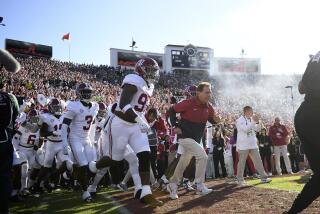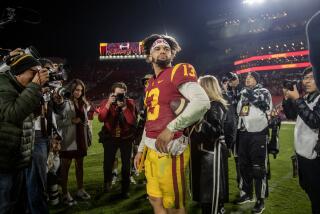Stop Sapp? Call ASAP : If Anyone Has a Clue About How to Contain Miami’s Tackle, Nebraska’s Coaches Would Probably Like to Hear it
- Share via
After Rutgers lost to Miami earlier this season, Mark Deal received a phone call from Jimmy Heggins. Deal is the offensive line coach at Rutgers, Heggins is the offensive line coach at Florida State. Heggins needed information . . . and hope.
The Seminoles were to play Miami next and everyone knew what that meant: Warren Sapp, the best college defensive lineman on the planet. So Heggins, who had never spoken to Deal before, didn’t waste much time with pleasantries.
“Coach,” said Heggins, his North Carolina accent in full bloom, “how’d y’all do against him?”
Deal considered the damage. Sapp had recorded seven tackles, a sack, four quarterback pressures and a fumble recovery. So dominating was the performance, Miami coaches presented Sapp with a game ball. Yet, after reviewing the videotape to grade his offensive linemen, Deal thought the Scarlet Knights had done a decent job.
And that was the scary part--it could have been worse.
Meanwhile, Heggins waited for an answer.
“Well, you got to hope,” Deal told the Florida State coach. “You got to hope for a rainstorm so he can’t get any traction. That’s the only way you’re going to slow him down.”
Heggins probably was hoping for more than a number to the National Weather Service. But Deal was right. Under mostly rain-free skies, Miami defeated the Seminoles and guess who got another game ball? Sapp recorded seven tackles, two sacks, two pass breakups and three quarterback pressures.
Deal saw the whole thing on TV. He knew what Heggins was going through.
“After watching him play against Florida State that Saturday night, I felt a lot better about how we did,” Deal said. “In fact, I told my linemen a couple days later, ‘You know, we ought to feel pretty good about that game.’ ”
In a nutshell, this is what the 6-foot-3, 280-pound Sapp does to opponents. He reduces everything to relative terms. If anyone else dominates Rutgers the way Sapp did, Deal will have his linemen pushing blocking sleds up the New Jersey Turnpike.
But Sapp isn’t like anyone else, which explains why Deal sought out the Hurricane star after the Oct. 1 game at Rutgers Stadium and said, “Warren, you’re a great, great player.” It is why Deal assigned two blockers to Sapp the entire four quarters, why Deal would have cast a Heisman vote for the Miami junior, why Deal is kicking himself for not teaching his linemen how to hold.
“He’s the best I’ve seen,” Deal said.
Sapp finished the regular season with a Lombardi Award and was the only defensive player invited to the Heisman Trophy presentation ceremony. He became buddies with Heisman winner Rashaan Salaam, the Colorado running back who was later sighted wearing a Hurricane baseball cap.
Sapp didn’t come close to Salaam in the balloting, but he didn’t seem to mind.
“No way am I going to get 920 (voters) to say I’m the best player in the country,” he said that day at the Downtown Athletic Club.
Then again, none of those 920 voters had to block him.
Sapp is a coach’s poster boy. Unselfish. Relentless. Borderline obsessed. In each of his three seasons at Miami, Sapp’s numbers have improved dramatically. From zero starts in 1992 to 12 this year; from 39 tackles to 84; from three sacks to 10 1/2; from zero fumbles caused to four; from zero fumbles recovered to three.
All this from a former high school tight end, linebacker and punter who wanted nothing more than to become the first 280-pound winner of the Butkus Award. Instead, Hurricane coaches converted him to defensive tackle and hoped for the best.
“I was just thinking about getting on the field, just playing,” Sapp said in a telephone interview. “Just let my boys see me on TV one time. That’s all there was to it.”
Miami ended up with a star, the latest in an impressive line of Hurricane defensive tackles that in recent years stretches from Jerome Brown to Russell Maryland to Cortez Kennedy.
Of course, Sapp knows all about Miami football history. As a freshman in 1991, he went out one night with Kennedy, Hurricane linebacker Jesse Armstead and Brown, who by then was an All-Pro with the Philadelphia Eagles. Brown died in an auto accident later that year, but the memory of the meeting never left Sapp.
When the Hurricanes traveled to Philadelphia’s Veterans Stadium to play Temple last month, Sapp was outraged to find not a single official remembrance of Brown.
“The years he gave (the Eagles) were great ones and it’s like they don’t even care that he played there,” Sapp said. “There’s no memory of him in any kind of way. If a player’s there for (years), the least you can do is put a jersey up for him or something . . . a ‘99’ (his jersey number) on the wall.
“I bet you those people in Philly remember him. There’s a Jerome Brown Assn. they started up there. It benefits the kids of Philly. If the city can do it, at least that raggedy organization could.”
Sapp is emotional that way. When Washington was putting the finishing touches on its stunning 38-20 victory over the Hurricanes, ending Miami’s NCAA-record 58-game home winning streak--Sapp still played as if a miracle were possible.
Steve Morton, Washington’s offensive line coach, remembers his players coming off the field after a 13-play, 6:58 scoring drive sealed the victory. They were talking about the amazing Sapp.
“It was at the end of the game,” Morton said. “We had controlled the ball. Several Miami players were taken out of the game. It was hot. It was physical. But my offensive linemen told me (Sapp) was still hustling. He was saying to the other Miami players, ‘Get up. Have some pride. Let’s get going.’ ”
Florida State offensive coordinator Mark Richt, a former Miami quarterback, has seen this from Sapp for the last three years. That’s why the Seminoles always made sure a center and guard or guard and tackle were placed in front of Sapp. Sometimes it worked, most times it didn’t.
“The problem is this: If you don’t get a special plan for him, he’s going to disrupt an X amount of plays--you just don’t know how many,” Richt said. “But if you do come up with a plan, then you’re changing things that you normally do well. We’re still trying to figure it out.”
Seminole Coach Bobby Bowden said, “You see powerful guys who aren’t quick. You see quick guys who aren’t powerful. You don’t see many guys who are powerful and quick.”
Bowden didn’t think twice about putting two blockers on Sapp. Nobody does. Try stopping Sapp with one lineman and your quarterback will soon have to take an injury timeout.
Sapp has seen every blocking scheme known to chalkboards. Boston College tried a weird one, pulling a guard to help the other guard block him. Interesting idea, but Sapp managed to finish with seven tackles. Virginia Tech kept moving a tight end to Sapp’s side. Another opponent once double-teamed him on pass plays and then had a running back waiting to block, too.
“I’ve always faced those kinds of things,” Sapp said.
The Hurricanes run the same defense they’ve run for years: four defensive linemen, three linebackers, two cornerbacks, two safeties. Nebraska, Miami’s Orange Bowl opponent Sunday, probably knows the stunts and coverages by heart.
But Sapp is the centerpiece. He constantly punctures the pass pocket. He creates mismatches elsewhere on the line. He never stops.
“My first thought was, ‘This guy has to choke himself to sleep at night,’ ” said J.B. Grimes, Virginia Tech’s offensive line coach. “He’s one of the few defensive linemen I’ve ever seen who can take total control of a game. And this guy does it from the tackle position.”
Grimes watched hours of film on the Hurricane defense. He said he never saw Sapp quit on a play. And in a goal-line defense, Sapp is even more impressive.
But it was while viewing Sapp against West Virginia that Grimes nearly fell off his chair. The Mountaineers fumbled. Sapp picked up the ball, started running and then put the sweetest juke move on some poor West Virginia player.
“The guy just fell down,” Grimes said. “Never seen anything like it. If (Sapp) had a lower (jersey) number, you would have thought he was a running back.”
As the legend grows, so do the questions about Sapp’s future. With another season of eligibility remaining, Sapp could return to Miami or make himself available for the NFL draft. Of course, don’t bother asking Sapp about it.
Question: “So, Warren, have you given much thought to turning pro?”
Silence.
Question: “Uh, Warren, you there?”
Sapp: “Yeah, I’m here.”
Question: “So, do you give it much thought?”
Silence.
Sapp isn’t impolite, merely tired of the constant inquiries. Rather than lie about his plans, he says nothing at all. Fair enough.
Regardless of whether this is his last college game or his first of 1995, Sapp won’t have to worry about his Hurricane legacy. “He’s great,” Florida State’s Richt said.
The ‘90s sign of greatness? Sapp leads the country in most-phone-calls caused.
More to Read
Go beyond the scoreboard
Get the latest on L.A.'s teams in the daily Sports Report newsletter.
You may occasionally receive promotional content from the Los Angeles Times.










